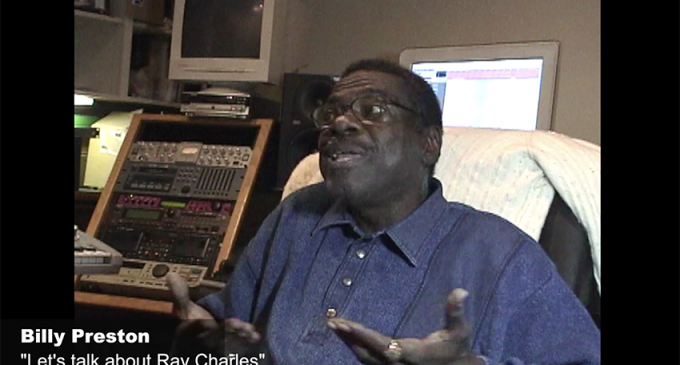Billy Preston – An interview series with Ruth McCartney

(A McCartney Times Exclusive)
This interview series was recorded in April of 2006, 2 months before Billy’s death in June of 2006.
Ruth McCartney takes us through the early years of Billy Preston’s career and upbringing to the last performance with The Beatles.
Billy Preston’s experiences from Ray Charles to The Beatles were discussed. Below are the interviews in chronological order:
William Everett Preston (September 2, 1946 – June 6, 2006) was an American musician whose work encompassed R&B, rock, soul, funk, and gospel. Preston was a top session keyboardist in the 1960s, during which he backed artists such as Little Richard, Sam Cooke, Ray Charles, Reverend James Cleveland and the Beatles. He went on to achieve fame as a solo artist, with hit singles such as “That’s the Way God Planned It”, the Grammy-winning “Outa-Space”, “Will It Go Round in Circles”, “Space Race”, “Nothing from Nothing” and “With You I’m Born Again”. Additionally, Preston co-wrote “You Are So Beautiful”, which became a number 5 hit for Joe Cocker.
Preston was one of five musicians credited on a Beatles recording other than the group’s four members. Preston continued to record and perform with other artists, notably George Harrison after the Beatles’ breakup, and Eric Clapton, and he played keyboards for the Rolling Stones on many of the group’s albums and tours during the 1970s.
Relationship with the Beatles
Preston first met the Beatles as a 16-year-old in 1962, while part of Little Richard’s touring band, when their manager Brian Epstein organized a Liverpool show, at which the Beatles opened. The Washington Post explained their subsequent meeting:
They’d hook up again in 1969, when the Beatles were about to break up while recording the last album they released, Let It Be (they would later record Abbey Road, which was released prior to Let It Be). George Harrison, a friend of Preston, had quit, walked out of the studio and gone to a Ray Charles concert in London, where Preston was playing organ. Harrison brought Preston back to the studio, where his keen musicianship and gregarious personality temporarily calmed the tension.
Preston is one of several people referred to as the “Fifth Beatle”. At one point during the Get Back sessions, John Lennon proposed the idea of having him join the band (to which Paul McCartney countered that it was difficult enough reaching agreements with four). Preston played organ and electric piano for the Beatles during several of the Get Back sessions; some of these sessions appeared in the film Let it Be and on its companion album. Preston also accompanied the band on electric piano for its rooftop concert, the group’s final public appearance. In April 1969, their single “Get Back” was credited to “The Beatles with Billy Preston”, the only time such a joint credit had been given on an official Beatles-sanctioned release (as distinct from an unsanctioned reissue of some Hamburg-era recordings on which they were the backing group for Tony Sheridan). The credit was bestowed by the Beatles to reflect the extent of Preston’s presence on the track; his electric piano is prominent throughout and he plays an extended solo. Preston also worked, in a more limited role, on the Abbey Road album, contributing organ to the tracks “I Want You (She’s So Heavy)” and “Something”.
In 1978, he appeared as Sgt. Pepper in Robert Stigwood’s film Sgt. Pepper’s Lonely Hearts Club Band, which was based on the Beatles’ album of the same name, and sang and danced to “Get Back” as the penultimate song.
Signed to the Beatles’ Apple label, in 1969, Preston released the album That’s the Way God Planned It, produced by Harrison, the title song from which was a hit single in Britain. His relationship with Harrison continued after the Beatles’ break-up in 1970; Preston was the first artist to record Harrison’s subsequent international hit “My Sweet Lord”, on his 1970 album Encouraging Words, which Harrison co-produced with him. He appeared on several of Harrison’s 1970s solo albums, starting with All Things Must Pass; made a notable contribution to the Concert for Bangladesh, the Harrison-organized 1971 charity benefit; performed with the ex-Beatle on his 1974 tour of North America; and played at the 2002 Concert for George tribute, held at London’s Royal Albert Hall. Preston also worked on solo releases by Lennon and Ringo Starr.
In 1971, Preston left Apple and signed with Herb Alpert’s A&M Records. The previous year, he contributed to another hit single when Stephen Stills asked to use Preston’s phrase “if you can’t be with the one you love, love the one you’re with”, a song on Stills’ self-titled debut solo album.
Source: McCartney Times, Martin Nethercutt (editor)




There are no comments at the moment, do you want to add one?
Write a comment